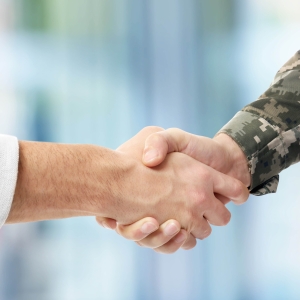A Veteran’s Guide to Military Separation and the Transition to Civilian Life
February 20, 2019- Practice
Veterans can take advantage of many valuable career, housing and medical services to transition seamlessly to a fulfilling civilian life.
For many veterans, the transition from serving in the military to civilian life can be an overwhelming period. Service members are faced with a number of new challenges, from securing housing and deciding on a new career path to managing their finances and medical needs. Unfortunately, many service members and veterans are not aware of the resources available to aid them throughout this transition, while others may feel hesitant or embarrassed to seek help.
John Gutierrez, operations manager for America’s Job Center of California (AJCC) at JVS-Socal and a member of the Los Angeles Veterans Collaborative (LAVC) Career Advancement working group, encourages all service members and veterans to feel empowered to seek out transitional services as they re-adjust to civilian life. Since leaving the military in 2014, Gutierrez has been committed to creating a more seamless, supportive transition period for veterans entering the civilian workforce.
USC Suzanne Dworak-Peck School of Social Work: Did you personally feel prepared to transition out of the military?
John Gutierrez: I enlisted in the Marine Corps at the age of 18. After a military-wide downsizing initiative, I was forced to retire from the Marines after 15 years of service. I felt as though I wasn’t prepared—I had planned on remaining in the military longer and hadn’t decided what I wanted to do afterward. I had a 1-year-old daughter and a mortgage to pay.
Meanwhile, the Department of Defense (DoD) doesn’t allocate the same time and resources to transitional training as it does to other kinds of military training. The information you receive during a weeklong transitional training can go in one ear and out the other as you’re preparing to leave.
USC: What resources, if any, were most helpful to you during this period in reacclimating to life and work as a civilian?
JG: While I was still stationed at El Segundo, I was lucky enough to learn about the workforce development organization JVS SoCal through Mayor Eric Garcetti’s “10,000 Strong” veterans hiring initiative. I became a case manager for one of their workforce investment programs and now oversee America’s Job Center of California, helping other veterans transition into civilian careers.
USC: Based on your own experiences, what advice would you offer to service members preparing to re-enter the civilian world?
JG: When you separate from the military, you lose a major support system, so your priority should be establishing a strong foundation of support. Focus on reconnecting with your friends and loved ones while also seeking out effective transitional resources.
During my transition, I wish that I had known about the countless nonprofit organizations, workforce programs, and federal and state organizations dedicated to helping veterans find a great job, affordable housing, financial counseling, and physical and mental health care. I would encourage veterans not to feel guilty or undeserving of that help, but instead to reach out and take advantage of the tools available to them.
USC: What types of transitional resources are available through JVS SoCal and other Los Angeles-based organizations?
JG: At JVS SoCal, we provide veterans with comprehensive career coaching. That includes skill assessments, resume workshops, training in specific fields, job placement assistance, and additional service referrals. For some veterans, we can even offer funding for specific trainings or certification courses. JVS SoCal also includes the Women’s Leadership Network, a philanthropic group that provides women veterans with career-related financial assistance during their transition.
In addition to the resources we offer in-house, we refer veterans to a number of other transition-focused services based on their individual needs:
- Veterans and Loved Ones Recovery (VALOR) Program at the LA County Department of Mental Health for professional mental health care services
- Military and Veterans Affairs of LA County for a suite of programs and benefits ranging from housing and health care to education
- Career Transition Assistance Plan (CTAP) and the Interagency Career Transition Plan (ICTAP), government-sponsored programs that can provide veterans with preferential hiring status
- Veterans Benefits Administration for a range of financial resources spanning everything from low-interest and debt-to-income-based mortgage loans to life insurance packages and pension programs
- U.S. Vets Career Network for comprehensive career development services and job opportunities
- Heroes Linked for financial advising, career mentorship and transitional services
- Vet Hunters Project, a grassroots outreach initiative to eradicate veteran homelessness
- Higher Ground, a recreation, therapy and support network for veterans, military spouses and families
USC: In your view, why is it so important that recently separated veterans are aware of and take advantage of these services?
JG:If service members learn about these resources earlier in the separation process, I believe they can reduce their risk of stress, mental health issues, unemployment and homelessness.
Many veterans come to JVS SoCal having already exhausted their Yellow Ribbon Program or GI Bill benefits because they needed the stipend money for immediate needs. It’s unfortunate, because perhaps if they’d known about other financial assistance or career development opportunities, they could have reserved those benefits for use down the line.
To reference the work of our faculty online, we ask that you directly quote their work where possible and attribute it to "FACULTY NAME, a professor in the USC Suzanne Dworak-Peck School of Social Work” (LINK: https://dworakpeck.usc.edu)
